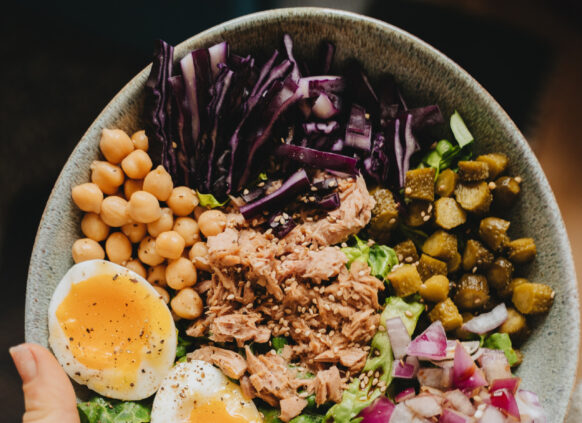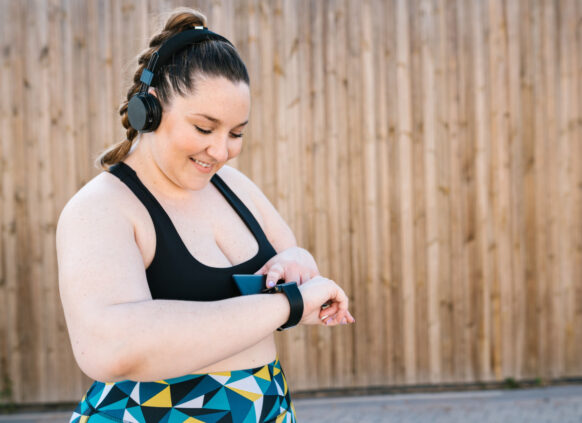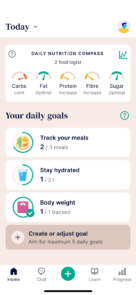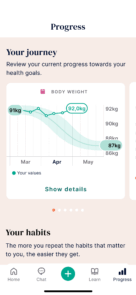
Best diet for weight loss (from an NHS dietitian)
The best diet for weight loss is one you can stick to. Balanced, flexible ways of eating, like the Mediterranean or Flexitarian diet, support long-term weight management far more than extreme dieting.
There’s no one-size-fits-all, and finding the best one for you can feel overwhelming. To cut through the noise, one of our dietitians talks through the best diets for weight loss.
If you have a BMI over 35 and a weight-related health conditions, you may be eligible for Oviva. With Oviva, you’ll access a personalised weight loss plan, support from healthcare experts and, if appropriate, weight loss injections.
Key Takeaways
- The best diet for weight loss is one that’s sustainable, meaning it can be adopted for the long term.
- Examples of sustainable diets with a proven track record of success include the Mediterranean Diet and the Flexitarian Diet.
- A nutrient-rich diet is essential for long-term weight management and overall health, which includes preventing weight regain over time.
- If you’re eligible for referral to Oviva, our expert team can provide personalised care, helping you to maintain healthy dietary habits while considering your individual needs.
Why the best diet for weight loss should be sustainable
The best diet to lose weight in the long-term will typically be sustainable, as opposed to a diet designed to be a short term fix. This is because a sustainable diet can be adopted for the long term, achieving not only the initial weight loss but also weight management over time.
According to NHS recommendations, you should aim for 1 to 2 lbs (0.5 to 1 kg) of weight loss per week. This can be achieved by aiming for a calorie deficit of 600 kcal.
The recommended daily calorie intake for the average person who is not trying to lose weight is 2,500 kcal for men and 2,000 kcal for women.
Therefore, a 600-calorie dietary deficit would involve men consuming around 1,900 kcal per day and women consuming around 1,400 kcal per day.
Of course, this is generalised guidance, and the specific amount you should eat may depend on a variety of other factors. Calories are a useful starting point for some people, but achieving a good nutritional quality of your diet is equally important.
In some instances, a healthcare professional may recommend a short-term intervention such as a very low calorie diet (VLCD). However, these are only recommended in specific instances, and only when they can be carried out under the supervision of a medical professional.

Dramatic diets vs sustainable diets: weight loss and regain
A 2018 review of long-term obesity management (Kevin D. Hall et al.) found that initial weight loss can be achieved in a wide range of ways, but sustaining that weight loss and managing weight over the longer term is a far more challenging prospect.
For most people, adopting a nutrient-rich diet is best for long-term sustainability.
Another study from 2023 (Aisha Farhana & Anis Rehman) explores the effects of weight loss on metabolism. The authors explain that weight loss programmes are directed to encourage weight loss at a rate of 0.5 kg to 1 kg per week because this is associated with better long-term outcomes. It also avoids drastic changes in metabolism associated with crash diets.
Sustainable weight loss diets reviewed
Various sustainable diets have demonstrated effectiveness for weight management, and the Mediterranean Diet is one example. A 2016 trial (Joseph G. Mancini et al.) found that the Mediterranean Diet outperformed a low-fat diet over 12 months, with mean weight loss of -4.1 to -10.1 kg compared with 2.9 to -5.0 kg with the low-fat diet.
The Mediterranean Diet consists of plenty of fruit, vegetables, whole grains, nuts and olive oil, alongside moderate levels of fish and poultry consumption. Red meat intake is kept low. The result is a diet high in fibre and other important nutrients. The Mediterranean Diet has also been linked with various positive health outcomes, including improved heart health.

Another option is the Flexitarian Diet, which is a semi-vegetarian diet. It’s primarily plant-based, with low levels of meat and animal products. As a result, it can provide many of the benefits of a vegetarian diet without requiring you to eliminate meat.
A 2017 evidence review (Emma J. Derbyshire) found that the Flexitarian Diet has health benefits related to weight loss, metabolic health and diabetes prevention.
Meanwhile, a Harvard 2023 study of 119,000 people found that adherence to eating plans like the Mediterranean Diet and the Plant-Based Diet was associated with up to a 20% lower risk of total mortality.
Most importantly, the best diet for weight loss will be unique to the individual. This is why Oviva is so proud to provide personalised care and support.
For more information, check out our 13 tips to lose weight sustainably and successfully.
The role of diet in long-term weight management
Diets for weight loss can vary significantly, but when it comes to long-term weight management, it’s critical to adopt a nutrient-rich diet. This ensures you can follow the diet plan for months or even years without experiencing nutritional deficiencies.
Some key areas to focus on include getting sufficient fibre (30g per day), eating lean proteins (0.75g per kilo of bodyweight) and getting plenty of fruit and vegetables. The NHS recommends 5 portions of fruit and veg a day, with 80 g of fresh, canned or frozen fruit and vegetables per portion.
Intense diets may provide short-term weight loss, but they’re unsustainable and often lack essential nutrients by drastically reducing food intake or cutting out food groups – you risk negative impacts on your health due to not achieving the nutrition that you need.

Incorporating whole foods into your diet
When exploring the question, “What is a good diet to lose weight?” It’s worth focusing on incorporating whole foods in place of processed foods whenever possible.
You can identify whole foods by thinking about foods that have a single ingredient and which are either unprocessed or minimally processed. This includes vegetables, fruit, whole grains, pulses and minimally processed fish or meat (e.g. lean chicken breast, oily fish, white fish and eggs).
A good test is to read the ingredients on the back of the packaging – if there are any ingredients on there that you don’t recognise, or wouldn’t expect to find in a kitchen, it’s likely processed.
The NHS recommends including plenty of whole foods because they’re full of vitamins, minerals, fibre, protein, and phytonutrients that protect against disease.
Healthy eating plans based largely around whole foods, including fruits, vegetables, whole grains, nuts, and legumes, have been linked with a lower risk of premature death.
Balancing macronutrients for weight loss
Macronutrients are carbohydrates, protein and fat. They’re the nutrients we need in large quantities to provide us with energy, and they need to be balanced for optimal nutrition.
The NHS offers the following advice on dieting food for weight loss:
- Around one third of your food should be starchy foods. Opt for wholemeal or wholegrain forms, like brown rice, wholewheat pasta and brown bread, as much as possible.
- Aim to eat at least 5 portions of fruit and vegetables per day.
- Try to make space for dairy or dairy alternatives, like soy-based drinks.
- Eat eggs, beans, pulses, nuts, fish and lean meats like skinless poultry to get plenty of protein.
- While you need some fat in your diet, try to minimise saturated fat. Healthier fat sources include unsaturated oils and spreads eaten in small amounts.
You can track your daily macronutrients using the best weight loss apps. Or, for more on this, discover what to eat before bed to lose weight.
Oviva patient success stories:

 -22kg
-22kg
Heidi (53)

 -25kg
-25kg
Martin (34)

 -32kg
-32kg
Patricia (53)

Weight loss diet myths debunked
Myth 1 – The best diet involves rapid weight loss
While some people can benefit from diets that produce quick results because those early results provide much-needed motivation, crash diets should be approached with caution.
Generally, a steady and sustainable diet is preferable. Try to find an approach that provides all the nutrition you need and you can keep going with in the longer term.
Myth 2 – Carbohydrates make you put on weight
When eaten at the appropriate level, carbohydrates will not lead to weight gain on their own.
The Reference Intake (RI) for carbohydrates for an average adult is 260 g a day. Some people choose to eat less than this, and a reduced carbohydrate diet works well for some people.
Try to stick to wholegrain and wholemeal carbohydrates as much as possible.
Myth 3 – You need to adopt a very low-calorie diet to lose weight
Rather than adopting a very low-calorie diet, which can often mean 1,200 kcal or less, it’s safer to adopt a calorie deficit in line with NHS guidance, which means around 1,900 kcal per day for men and around 1,400 kcal a day for women.
Some people do benefit from very low-calorie diets, but they should only be adopted for limited periods of time and with supervision from healthcare professionals.
Finding the best weight loss diet for you
Oviva is available on the NHS – we’ll work with you to create the best diet for weight loss based on your unique circumstances and needs, including access to NHS weight loss injections.
It’s easy to find out if you’re eligible:
- Download our info pack for everything you need to take to your GP
- Book an appointment with your GP
- Ask them to check if you’re eligible
- If you are, ask them to make quick and simple referral








